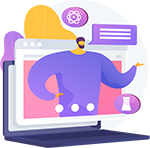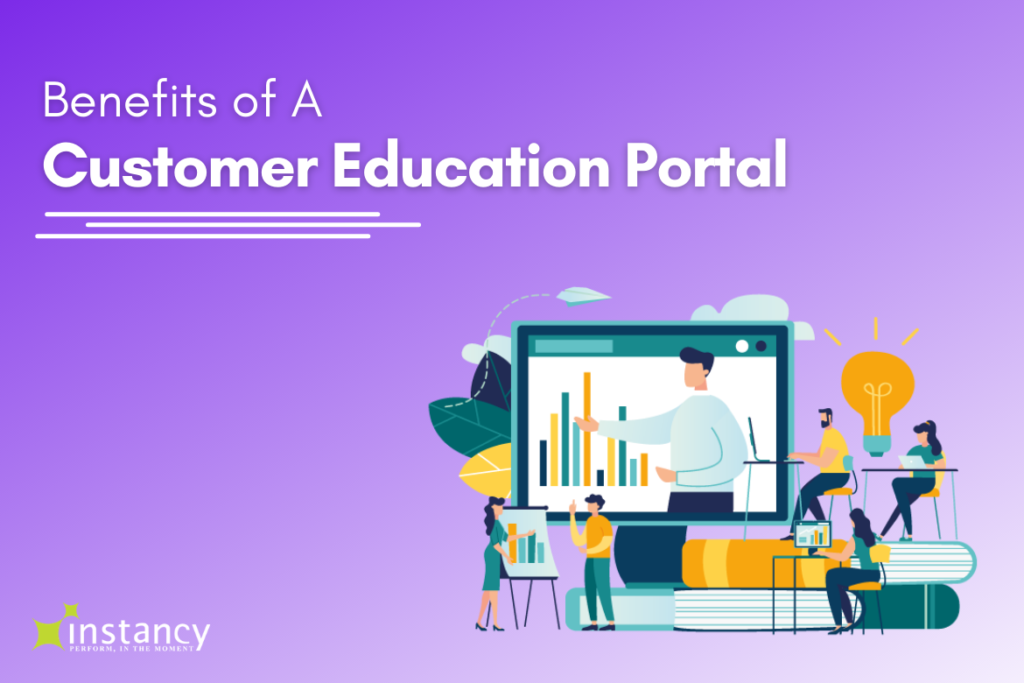The goal of every business is to develop products and services of value to their customer base. Businesses continually strive to create the perfect and profitable products that meet the needs of their customers, hence, solving any ‘pain points’ their customers may have.
With today’s hyper-competitive market and advanced technology, products are inherently more complex. Therefore, customer education programs are necessary to ensure adoption by your customers, which, in turn, makes your products more successful in the market.
To add a layer of complexity, you should tailor the education, so each client or user receives the product knowledge based on their skills level, job role, location, language, or business need.
An LMS designed to support customer education can be instrumental in delivering online customer education. Online learning may include a range of resources including structured eLearning courses, videos, webinars, document library, assessments, and also informal conversations like discussion forums, infographics, question and answer knowledgebase.
A modern learning management system can help aggregate all the product knowledge resources in one place and channel them to the right person at the right time.
In conjunction with a robust learning management system, you need to offer outstanding learning resources including eLearning courses.
Reach out to your subject matter experts (SME) for help. SMEs can be engineers, product owners, product marketing, scientists, etc.
However, it is the instructional design that becomes important. How you design the delivery of the information makes all the difference. Instancy’s learning content management and authoring system can help you manage and reuse your content for different audiences.
What is Customer Education?
Customer education is a set of programs developed by a company that provides consumers and business customers with the information, skills, and abilities they need to be successful with a product.
In other words, it is the process of arming customers with the tools and resources they need to become a more informed buyer or consumer of your product or service.
The primary goal of customer education is to onboard, engage, and retain new and existing customers. Customer education used for presales assists the customer to discover the features of the product and develop an opinion regarding how your product or service can meet their needs. Conversely, after the sale, customer education focuses on educating them on the use of the product.
When you build a customer education program, you are making it easier for your existing and potential customers to recognize its full value. It provides answers to most, if not all, the questions customers may have, thus creating a positive experience. If you also offer the course to your employees who work with the customers, your staff can provide better support.
Benefits of Creating an Online Customer Education Portal
Creating a customer education program can have a significant impact on your business in several ways. Here are the key benefits of investing in customer education.
1. Onboarding is faster and easier
Onboarding is the knowledge transfer of information necessary to use the product. A customer education program details how the product works, the benefits it offers, and why they should choose your product over others on the market.
Rather than trying to educate large groups daily, customer education allows your customer success managers to attend to every customer at scale using largely automated tools. That way, you will be able to onboard many customers with the least effort and resources.
2. Reduced support costs
Another benefit of customer education is the reduction of support costs. Support teams spend countless hours answering the same questions over and over again, leading to loss of job satisfaction as well as increased support costs.
A customer education program helps reduce the burden on your support team since the training content provides answers to most of the questions customers ask. As a result, you will see a reduction in support tickets and fewer employees dedicated to responding to them, freeing up resources for other critical business tasks.
3. Brand Loyalty
The more customers know about your product, the greater the perceived value, decreasing the likelihood they will shop around for an alternative product. An added advantage to brand loyalty is word-of-mouth recommendations, which helps attract new customers to your brand. Also, when customers become loyal to a brand, the cost of goods sold decreases for repeat purchases versus the cost of acquiring a new customer.
4. Customer satisfaction
Imagine you bought a new car that’s attracted many positive reviews. You are aware that it has plenty of exciting features to make driving enjoyable, and now you’re about to ride it for the first time.
The problem is that if you don’t know how to use its features, you cannot experience the car completely. What was supposed to be a fun ride suddenly becomes less enjoyable because you don’t know how to use the cool features. Similarly, people not sufficiently trained in a product or service tend to be unsatisfied.
Customer education makes it possible for your customers to gain sufficient knowledge about your product, thereby increasing customer satisfaction and reducing complaints and product returns.
5. Positions your brand as trustworthy
Never take an ‘ignorance is bliss’ approach with your customers. Some companies believe that keeping customers in the dark enhances loyalty. That is the wrong stance to take because eventually, the customer may look for alternatives. Your competitor empowered them through education, making their product and company appear better than yours.
A primary reason many businesses shun customer education is that they fear educating their customers can make them know so much that they shop around and choose an alternative. The idea is that by keeping customers in the dark, they will be able to force loyalty, but that approach is ineffective.
Educating your customers is a better approach because there’s a chance that they will be grateful to you for educating them. In effect, they will trust your brand more and be more willing to reward you with glowing reviews as well as recommend you to others.
6. Encourages customers to create online communities
Previously, customers would only approach a company when they wanted to buy a product or find a solution to their problem. The advent of social media changed that. Now customers have the opportunity to network with other areas of the company, such as the product development team.
Customer education can help kick-start online communities where educated customers can provide answers to new users who may have questions. Your business profits from these communities by reducing customer support tickets fostering user-generated content and word of mouth referrals.
7. Positions you as a market leader
Top brands are already focusing on customer education, and creating a program for your product helps position you as a market leader. One of the attributes of a market leader is that they share industry-specific knowledge, creating the perception that they are experts in the field. This aids in the conversion of visitors to customers while equally strengthening your brand.
How does Instancy help you make the customer education process more effective?
With any time, anywhere access to product knowledge, your customers can access the education on any device – desktop, progressive web app (PWA), or native mobile app.
1. Instancy allows you to create one or multiple client-specific sites for different customers or product knowledge communities effortlessly with drag and drop tools. No programming is required.
2. Intelligent, personalized, and blended learning to help your customers succeed.
Instancy provides a versatile learning platform to offer multiple modalities of learning, from video, eLearning, webinars, and learning paths to podcasts. Organize your learning around client type, job role, skills, or location. Offer your training in multiple languages.
3. Easy learning analytics to gauge customer engagement. Through dashboards and reports, your client success team can track learning success. Client administrators can also get access to their learner’s progress through admin portals and scheduled reports. Automate actions based on certain conditions to push the right learning to the right person.
Conclusion
Many top brands are now deploying modern learning management systems like the Instancy Learning Platform focusing on customer education because of the many benefits it offers. If you are planning to leverage customer education for your business, Instancy is the learning management system to trust. Sign up now for a free trial and see for yourself why Instancy is the platform of choice for millions of users.




